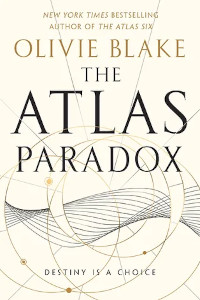
The Atlas Paradox by Olivie Blake.
Highlights
The burnings were a fine reminder of something Gideon had learned long ago: there is doom to be found everywhere if doom is what you seek. — p. 8
As with any chronic condition, his survival was a matter of becoming more comfortable, not some elusive unreality of being wholly pain-free. The trick was managing it until it no longer bit so angrily or stung. — p. 67
We can’t help clinging to our origins, Callum said. The past always seems more ordered, Rhodes. It always seems clearer, more straightforward, easier to understand. We have a craving for it, that sense of simplicity, but only an idiot would ever chase the past, because our perception of it is false—it was never that the world was simple. Just that in retrospect it could be known, and therefore understood. — p. 126
“I believed the universe was completely random, and that’s what eluded us. Because we all want to believe we are fundamental in some way. We are our own myths, our own legends. We give things reason. We are reasonable creatures and so everything must have its place, its purpose—but we are also egotistical creatures, and so we give ourselves reasons that don’t exist.” — p. 155
He enjoyed Sundays. He did not feel dread about Mondays. He did not feel dread, dread was for people who wanted to suffer twice, suffer three times. — p. 249
They took pride in their students’ failures, which they interpreted to mean that their standards were high and not that they were insufficient educators. — p. 280
This was just the world. You trusted people, you loved them, you offered them the dignity of your time and the intimacy of your thoughts and the frailty of your hope and they either accepted it and cared for it or they rejected it and destroyed it and in the end, none of it was up to you. — p. 389
Belen had by then come to understand that much about the world: that where there was a clean user interface and promises of groundbreaking transparency, there was probably also money. — p. 425
Had to have hope, they said, because when the hope died, that’s when everything went downhill. But it wasn’t hope, Belen wanted to say, it was some bizarre sense of entitlement. The failure to believe in failure—or even to accept the nature of things and adapt—felt like an extreme form of narcissism. — p. 426